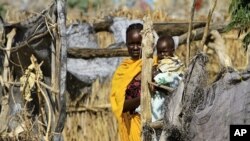The United Nations, the African Union and Sudan are trying to seize the moment created by the southern Sudanese independence referendum to push for speedy completion of a peace deal in Darfur. Hopes for peace have been boosted by word that previously hesitant Darfur rebels groups will join talks hosted by the government of Qatar.
Hope was in the air Thursday at a three-party high-level meeting on finding a path to peace in Darfur. After eight years of war and the loss of hundreds of thousands of lives, the successful south Sudan independence referendum has raised expectations of a settlement in the western region.
Darfur rebels groups that until now had shunned the Doha talks have said they will be there when the talks resume Saturday. And the Khartoum government is allowing the joint United Nations/African Union peacekeeping force UNAMID greater freedom to patrol conflict zones.
UN Peacekeeping chief Alain LeRoy says the Doha talks are expected to lead to a ceasefire by the end of this month. He said that would pave the way for immediate negotiations on a broader political process.
"The time frame we all have in mind is the same, using the month of February to conclude as much as possible an agreement in Doha but also to prepare for the orderly transition from Doha into the Darfur political process," he said. "A lot is already agreed in Doha, and that should be the basis for the Darfur political process be undertaken from March in Darfur."
African Union Peace and Security Commissioner Ramtane Lamamra said the goal is to have a Darfur agreement ready to sign by July, when Southern Sudan’s independence is due to become official.
"We need to move fairly fast. I believe we can do that," said Lamamra. "The government is willing to co-operate, the armed groups which have joined Doha seem ready to commit themselves. They have days and weeks to show indeed they have that political will. They don’t have months for that."
One of the biggest challenges will be persuading Darfuris displaced by years of war that it is safe to go home. To enhance security, the Khartoum government has given UNAMID troops freedom of movement in former no-go areas.
Sudan’s Undersecretary for Foreign Affairs Rahamtalla Mohamed Osman said the government is cooperating with UNAMID to ensure safety of the returnees.
"Thousands of them are going back to their villages, but we would like this not to be something of a haphazard," said Osman. "We want it to be a process that accommodates all the concerns of the displaced persons themselves."
UNAMID Chief Ibrahim Gambari acknowledged the difficulty of persuading Darfuris terrorized by war that it is safe to go home. He says the government will have to issue written orders to warring factions to stand down and allow villagers to return.
"What we want to do is have that in written form translated into Arabic in written form so that at lower level so we will be able to show those who are impeding movement that we have clear commitment from the government," he said.
UNAMID officials say troops have been given a more robust mandate to protect civilians, and are making as many as 150 patrols a day into the region to ensure security.
War broke out in Darfur in early 2003. The United Nations estimates as many as 300,000 people died in the early years, when pro-government forces swept through the region, killing and burning villages. The government, however, says the death toll was about 10,000.
Tripartite Group Sees Peace in Darfur by July












